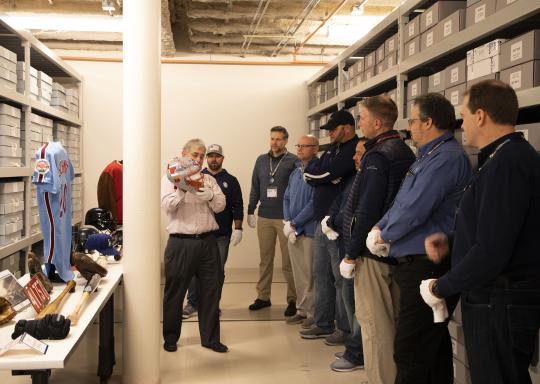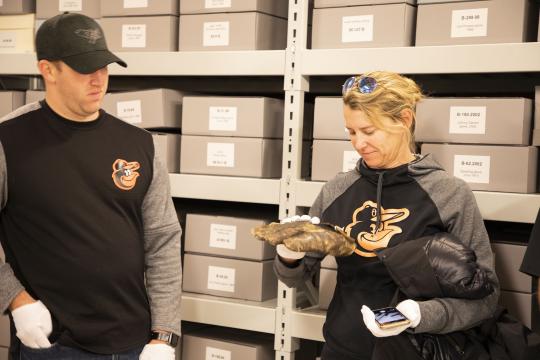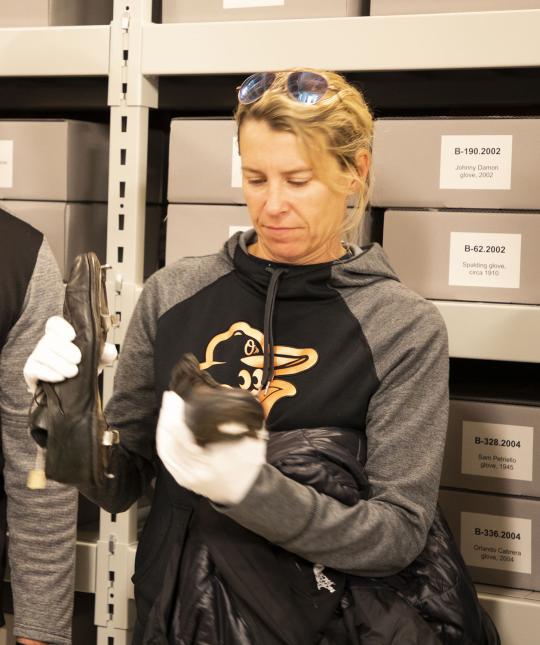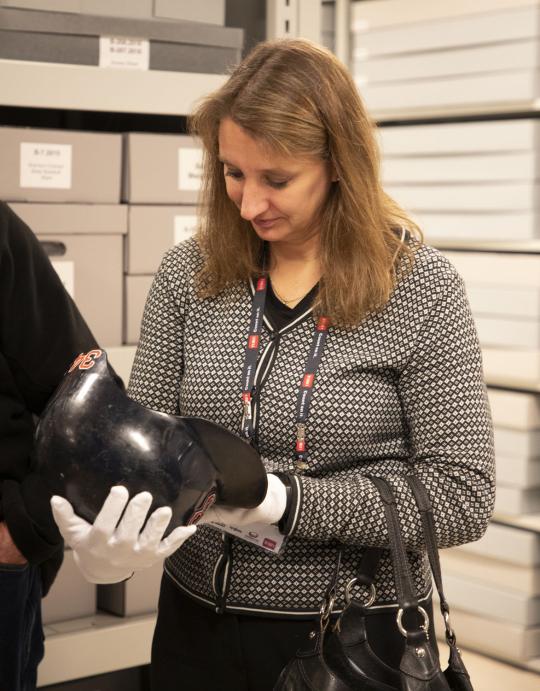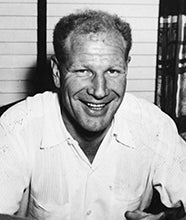- Home
- Our Stories
- MLB groundskeepers enjoy conference in Cooperstown
MLB groundskeepers enjoy conference in Cooperstown
Groundskeepers, which date back to the earliest days of baseball, are oft-forgotten but important figures in the game.
Hall of Fame owner Bill Veeck once expounded on their importance, saying: “A good groundskeeper can be as valuable as a .300 hitter.”
Many of today’s top keepers of the field visited Cooperstown in December for the 22nd Annual Major League Baseball Groundskeeper Symposium.
The schedule, with its many networking and educational events, included meeting with MLB officials, a discussion on field clays and rootzone testing, lessons learned while working in the Dominican Republic, dealing with agronomic challenges, sponsor presentations and a behind-the-scenes tour of the Hall of Fame.
Hall of Fame Membership
There is no simpler, and more essential, way to demonstrate your support than to sign on as a Museum Member.
Official Hall of Fame Apparel
Proceeds from online store purchases help support our mission to preserve baseball history. Thank you!
John Tornour, the director of field operations for the Washington Nationals, organized this year’s unique conference that both enhances the profession and enriches MLB.
“We all love what we do, to be able to go out inside a Major League Baseball stadium each and every day and work on the field,” said Tornour. “For the players that are out there on a day-to-day basis, it really kind of sets the table for them and allows them to perform at their highest ability. It’s something we take a lot of pride in.”
According to Tornour, who just completed his 10th season in his current position and 17th in the big leagues, almost two dozen of the 30 big league teams were represented in Cooperstown by either a head or assistant groundkeeper.
“This is an opportunity for us to get together once a year, our colleagues throughout Major League Baseball and our sponsors and our vendors,” said the 2001 North Carolina State Turfgrass Graduate. “We meet, we talk, and we have some set topics that we go over. We have some good conversations. It’s just really an opportunity for us all to get together and share ideas and have some good dialogue.”
It was also the first time the group of groundskeepers all met in Cooperstown.
“It’s an unbelievable, unique experience for us all to be here. We travel to different cities each year. When we all got together at out last meeting in January in San Diego, the idea came up whether we wanted to consider Cooperstown for our next meeting,” Tornour said. “We all realized how special it would be for our group. Obviously, there’s a lot of meaning here for us. It’s very relevant for our group. It started out as an idea and 12 months later here we are for our 22nd meeting.
“What’s funny about that is we typically have these meetings in January in warmer climates. We talked that if we do Cooperstown we should really consider moving it up to November or December to hopefully avoid any potential weather issues. And then as luck would have it a foot-and-a-half of snow fell right before we arrived. But thankfully everything worked out well for everybody to get here.”
Among the symposium participants in the baseball history museum were a pair of history-making individuals: Detroit Tigers head groundskeeper Heather Nabozny and Baltimore Orioles head groundskeeper Nicole Sherry.
The trailblazing duo were the first – and thus far only – female head groundskeepers to work for a major league team.
Nabozny, who completed her 21st season as the head of the Tigers grounds crew in 2019, made national news when she took on the job on Jan. 19, 1999.
“I’m responsible for, basically, the playing field,” said the Detroit native who graduated from Michigan State’s Sports Turf Management Program in 1993. “I’m caught between the baseball operations and the facility operations. I’ve got to make the team happy, but I also have to prepare the field for things like concerts and corporate events. It’s a fine line between the two. I’d rather just be on the baseball side, but that’s not the way it is anymore with multiuse facilities.
“In college, I didn’t really know what I wanted to do and worked for my dad, who had a lawn care company, in the summer. But working for his lawn care company I found out about Michigan State’s program. I wanted to go to athletic turf management and I ended up going into baseball. Baseball is just special.”
But unlike her male counterparts, it was news when Nabozny burst on the scene two decades ago.
“It started off with a boom, but has calmed down ever since. At the time I was 28 years old, moving from Grand Rapids to Detroit,” she said.
“At the time my focus was making the field the best field it could be. I didn’t really keep the whole female thing in the forefront of my mind. I just wanted to get my job done and try to manage the media the best I could do.
And the Tigers were great about it. But it was hectic the first year.”
Sherry, who in 2019 finished her 13th season as the O’s head groundskeeper, uses her status to educate.
“Being the second woman in major league history as a head groundskeeper is pretty special,” Sherry said. “I’m excited about being out there as a female representing groundskeepers in general. It’s not a job a lot of women look to. It’s a male-dominated, labor-intensive job, but there’s a lot of science involved, there’s a lot of technology we use every day. So a lot of the subjects kids are learning today you can use on a baseball field. Hopefully I can be an inspiration for women to get involved in the field.
“I’m a groundskeeper, but when you start talking about it and what it took to get here, what women in baseball face every day, it opens the door to a lot of other discussions. I think the younger generations are a lot more open-minded.”
According to Nabozny, she didn’t feel any pushback along her unique baseball journey, adding: “If there was I didn’t feel it. There could have been. I’m sure there probably was. But I’m not one to read a lot, good or bad. It’s just too hard to do my job when I’m getting all this other noise. Jim Leyland (former Tigers manager) would listen to the radio every morning and they were just ripping on him the whole time, but that was the way he was.”
Sherry, on the other hand, admits to mistreatment along the way.
“It happened and it was raw. It was hurtful. And when I think about it I get that feeling in the pit of my stomach,” Sherry said.
“And the people who have said things to me, where it was gender-related or sexual-related, I’d just think to myself that I’m here I’m in the big leagues and they’re not.
“I have a little boy and it’s my mission is to show him that women can do anything they want to do. And it’s sad that I have to say that in 2019.”
But Sherry does see improvements on the horizon.
“I always knew that I wanted to be outside working in plant science,” Sherry said. “My classes in high school and college took me to turf grass science. When you look back at your story you can see how all these dots finally connect.
“Today, there are a lot of women in turf grass science on the research side of it, but on the field, as far as professional leagues, there are not that many jobs, so that makes it seem like it’s only one in a million.
“There’s only 30 head groundskeeper jobs in the major leagues and I think I’d be remiss to not mention how lucky I am every day when I walk into Camden Yards.”
Before she left, Sherry shared a few general lawn care tips for the average homeowner: “Don’t cut your grass too short. Don’t overwater it. And when it’s so hot outside that you don’t even want to be outside, the grass does not want to be cut or walked on – just give it a break.”
Bill Francis is the senior research and writing specialist at the National Baseball Hall of Fame and Museum

